
New Local 2 Logo Sticker Now Available


BC Bricklayers and Allied Craftworkers, Local 2
Bricklayers, Stone & Marble Masons, Tilesetters

IN THE MATTER OF THE LABOUR RELATIONS CODE OF BRITISH COLUMBIA [RSBC 1996] c.244
AND
IN THE MATTER OF AN ARBITRATION
BETWEEN:
CONSTRUCTION LABOUR RELATIONS ASSOCIATION OF BRITISH COLUMBIA
(“CLRA”)
AND:
INTERNATIONAL UNION OF BRICKLAYERS AND ALLIED CRAFTWORKERS (IUBAC) LOCAL #2 BC
(the “Union”)
Wage Reopener
Section 86 – LRB Case No. 73004/19R
ARBITRATOR: Dalton L. Larson
COUNSEL FOR THE EMPLOYER: Ingrid Otto
COUNSEL FOR THE UNION: Derrill Thompson
CASE CONFERENCE: June 25, 2019
PLACE OF HEARINGS: Written Submissions
DATES OF SUBMISSIONS: July 12, 2019
July 17, 2019
July 25, 2019
DATE OF AWARD: August 20, 2019
1. Background
3.104 Wage Re-Opener
The wage re-opener referenced within Article 3.103(c) shall proceed as follows:
CM: I have my mandate. Not personal. Why are we doing a wage reopener? We are going into bargaining.
GH: Our guys are pissed with how far they have fallen behind in wages. CM: Agree to disagree on wage opener. Probs have to pay Vince a visit.
There was then some discussion about language in the agreement with the meeting breaking off with Mr. Mydske saying, “Leave it to me”.
the members of an employer’s organization are the companies that employ the employees. This has the effect of creating unique issues that are not involved in a typical relationship arising out of the conflicting interests of the member organizations. A council of trade unions will invariably experience jurisdictional issues between the constituent members and the members of an employer’s organization may be actual competitors or have dramatically different business interests or circumstances.
whether particular subjects were properly main table issues. The Chair established a process of trade level meetings during the first two weeks of February to try to move the process forward.
The following terms shall apply to each Agreement within each group above. Each trade shall receive an increase to their monetary package for their Journeyperson (or equivalent) classification and all other indexes should remain. For any trade that received an increase in April 2019 that increase shall be deducted from the increases outlined as follows (Emphasis added).
not arbitrable until these hearings. On that basis alone, I would be prepared to hold that if any of the time limits set out in Article 3.104 of the 2016-2019 collective agreement might be construed as legally binding, they were waived by CLRA.
arbitration to establish the facts to justify the discipline. Following the City of Toronto case, the arbitrator refused to admit it into evidence on the basis that it would be an abuse of process to relitigate the incident in circumstances where he would effectively be acting as a court of appeal in the matter.
There shall be only one collective agreement at a time between a trade union or council of trade unions and an employer or employers’ organization with respect to the employees in the bargaining unit defined in the collective agreement.
collective agreement but rather that the prior agreement under which the dispute occurred no longer exists and for that reason there is no live issue to be determined.
….. the parties create their own collective agreement within
certain statutory limitations (for example, the prohibition on strikes and
lockouts during the term of the collective agreement).
Arbitrators should be careful not to intrude unnecessarily into the collective bargaining process by interpreting language in an existing collective agreement where there is no live dispute.
What one must be careful to factor into the equation, however, is that some collective agreements make express provision for policy grievances, which are arguably moot by definition because they typically raise issues of principle or interpretation and do not provide any specific remedy to an individual grievor. Some agreements tend to deal with that problem by restricting policy grievances to those that could not be the subject of an individual grievance. More normally, however, the approach is more inclusive. A policy grievance is regarded as simply one of more general application and does not depend on whether is could be brought by one individual or several. See the discussion of the differences between the two approaches in Canadian Labour Arbitration, Brown & Beatty (4th ed) @ p.2-91 fn.2. Of course, where the collective agreement expressly contemplates grievances that are of an interpretive nature or whether the remedy may be declarative only or prospective, it is difficult to see how the doctrine of mootness could be properly applied to preclude arbitrability of the very thing that it is designed to permit.
collective bargaining demands that the current collective agreement is to contain and represent the whole agreement between the parties
pure happenstance that we are now faced with dealing with the wage reopener after the new wage schedule has been put in place.
Geoff. I know you do not agree with our position. However, at this point I don’t think there is any more reason to discuss things. We told you our reasons and it was certainly not “just because” as you put it below. Regardless, there is a process in the collective agreement to resolve the issue if you are not happy with our position. Thanks.
DATED this 20th day of August, 2019 at Tsawwassen, British Columbia.
Dalton L. Larson
Arbitrator
Would also like to add that Clayburn is looking for Eight members that have their API FOR Quality control. ON behalf of Alan Ramsay please see the message below;
During the month of September 2019, Bricklayers & Allied Craftworkers, Local # 1, Alberta, will be looking for Bricklayers & Registered Apprentices to work in Fort McMurray and area.
The Rate of Pay will be $ 48.42 NET and $ 59.32 GROSS.
The following Certificates will be needed to work:
OSSA Confined Space
OSSA Fall Protection
H2S Alive
BSO or CSTS with OSSA Regional
Photo ID
If any of your Members are interested please contact Local #1 Alberta at (780) 426-7545.
Our thanks and congratulations to 18 employees at Refraco BC Inc., working in the RTA ABF who now officially have the representation of a craft union at work.
Recently employees of Refraco signed enough union cards to trigger a “hard cert” vote which under new labour code rules must be held within 5 working days of the certification application. Friday during two pollings in person at 310-9th in Kitimat, the Refraco Office, employees voted yes well over the threshold of 50% plus 1 vote to officially certify Refraco BC Inc as an all employee bargaining unit of BAC Local 2 BC.
This could not be done without the overwhelming courage and desire of the fine women and men working their guts out in some of the hottest conditions anywhere in our crafts. Congratulations and great props to the inside organizers who made this happen. I’ve never seen a more motivated group nor a more textbook organizing drive.
Woohoo!
September 4 2019 Update.
We have received communications from the plant (see below) who assure us the camp is flat and there should be no problem with leaks. That seems to solve our safety concerns.
BUT, Another fact has just recently come to light, and it sounds like Clayburn was not aware of this either. The Plant owner now tells us that night shift will be housed in another camp IN Chetwynd. We were not made aware that this camp was going to be used for night shift.
The whole exercise appears to be intended to aggravate our contractor and our members into not doing the work. Leaving the door open for another (probably non union outfit) to do the work.
The union will send someone in to check out this camp in Chetwynd with an inspection checklist. Until then we know very little about the conditions there. See below for info from the CLRA about the Chetwynd Camp.
Hi Geoff
We finally got the information on the night shift at Pine River. The night shift will be staying in a separate camp (Flite Lodge) in Chetwynd which is also operated by Flite Camp Services with catering provided by Western Camp Services. I have attached the permits for this camp to this e-mail. Apparently the camp in Chetwynd is approximately two years old and is on the municipal water and sewage systems so there are no water permits. I’m thinking of reaching out to Tony at the Pine River camp to see if he can provide any information or details about this second camp given the connections between the two. Paul Strangway
Time is short. With the runaround happening with this job, members should consider that Alberta is in dire need of bricklayers at this time. Contact the hall or Geoff Higginson at 778-847-2472.
Email chain re the evac plan…
Good day,
I called you a moment ago and left a message.
I was wondering if you can send me copies of the Evacuation plan and confined space rescue plan you may have onsite. I require this information as the Union representative approval of the camp is still contingent on this confirmation of this information.
Please call me back at your earliest convenience to discuss as I really need this info.
Kind Regards,Triston Stone
Good morning Triston,
To follow up with our phone conversation. We are currently working with our ERP team out of Calgary to finalize an evac procedure for the camp that aligns with the plant, that being said we will be bringing the plant down and it will be flat for the duration of the TA. Camp currently has their localized ERP which they will use for any issues at camp that are not a result of what is happening at the plant.
As far as the Confined space rescue plans go, United safety is our safety contractor for TA. They have built rescue plans for each and every confined space. They will be carrying out all rescues. I can put you in touch with them if you need further clarity on the rescue plans.
As I mentioned I will be heading out today, I have cc’ed Larry he is my cross shift and will be available while I’m gone. (response from Cale Kinch)
Good day,
I have followed up regarding the evacuation plan on a conference call with Pine River safety this morning and I want you to know they are working on this as we speak and will provide it hopefully in a few days. Also the site will be shut right down during the duration of the turnaround so there will be no issue of a leak.
You can see the correspondence below from Pine river regarding the issues brought forth. I hope that this email will suffice that they are moving forward on getting this information and once made available I will forward it along.
If you have any questions or would like to discuss further please feel free to contact my anytime.
Kind Regards,Triston Stone
Hi Geoff
As you can see from the e-mail chain (below) the plant will be completely down during the maintenance cycle so a leak will not be an issue during this project. Paul Strangway
Thanks Paul. It is my understanding that during turnaround there could still be storage tanks of H2S on site. I am somewhat reassured but still haven’t seen the document that shows the camp outside of the exclusion zone.
________________________________________________________________________
September 3 2019 Update
Pine River Gas Plant Job-Camp. As of this moment, 1:26 p.m. the camp has been inspected and has met requirements under our camp regulations. There is one hangup. The camp is 1/2 a kilometre from the gas plant. The Union and the Contractor representative the CLRA have asked for an evacuation plan for the gas plant and camp in case of a gas leak. We have NOT seen this yet and the union (and contractor association and camp operator) is gravely concerned about approving the use of the camp without assurances that 200 camp dwellers can be evacuated safely if there is a leak. Please stand by today for confirmation of an evacuation plan. Check this link for previous leak at the plant and you will understand our concern. Our Blog for Members
Geoff Higginson
August 30, 2019 Update
The Owner, CNRL-SNRI requires a pre access test, under our policy it is a swab. See our policy here. The owner is having a health and safety meeting today to present the evacuation plan and hazard analysis. A reminder-Clayburn is probably the only union company on the site. The shifts are 7 days a week 12 hour shifts for approximately 23 days. There is a lot of work there. Brick, plastic, shooting. It is a dry camp. Clayburn says it will have a van there to get crews in and out of town. The camp has been inspected and is a long ways better than port mellon or even kmp camp. The camp is considered approved as long as the evac plan checks out. More asap on the evac.
August 29, 2019 the fire alarm tests all check out. Still have not received the plants evac plan. Remember his job is supposedly a dry camp. It is confirmed that the shifts are 7 12’s for about 23 days. There will be a van for members to go into town with. We are so far the only Building Trades union on site. There was a question as to whether or not there would be pre job d/a testing, and we are awaiting the news on that. If you accept work on this job you may find the work is postponed because the evacuation plan has not been properly provided.
August 28, 2019, Camp Approval Update.
August 28 2019 2327 hrs. CLRA representative Chris Mydske confirmed this evening via email that “Hi Geoff, I did hear back from Clayburn on the shifts. They are running 2 shifts both which are 7 12s. They are also going to be providing a van. If you need anything else let me know. Thanks.”.
Although the camp is a decent camp and follows the camp guidelines and an email to the CLRA indicated that the camp is outside of the hazard area of the gas plant, we still have not received the evacuation plan from the plant owner SNRI who is owned by CNRL. Until we see the risk assessment and evacuation plan I we can’t approve the camp. You should also know there have been conflicting reports about what the shifts are, 6 10’s or 7 12’s and whether or not there is a night shift. The company has confirmed that there will be a van available to take members to town when they are not working. Also know that the owner says that the camp will be a dry camp. I also understand that the work is extensive. They are calling for 20-23 days. Also note that Clayburn is the only Union Company scheduled for this job as far as I know.
Geoff Higginson


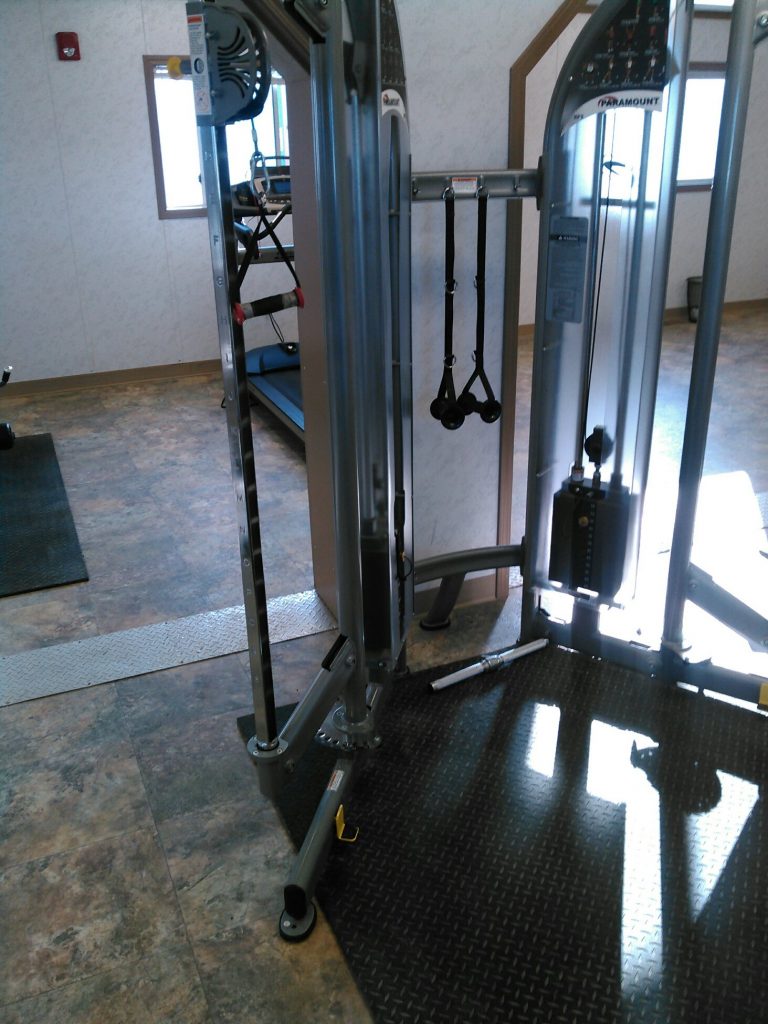
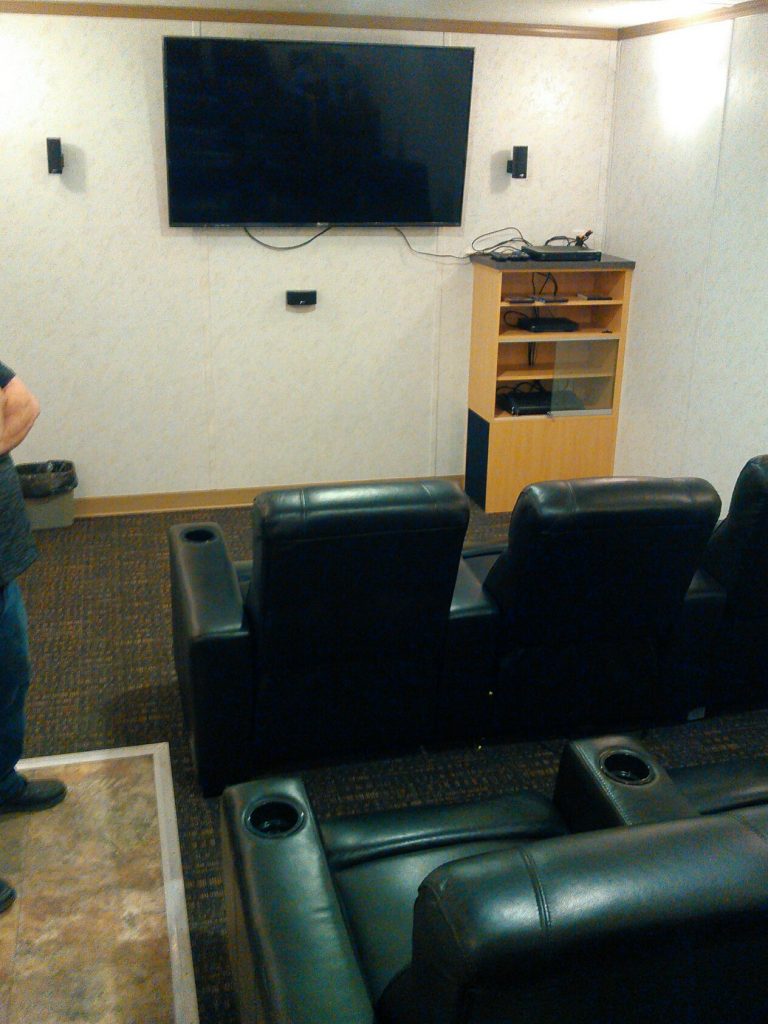
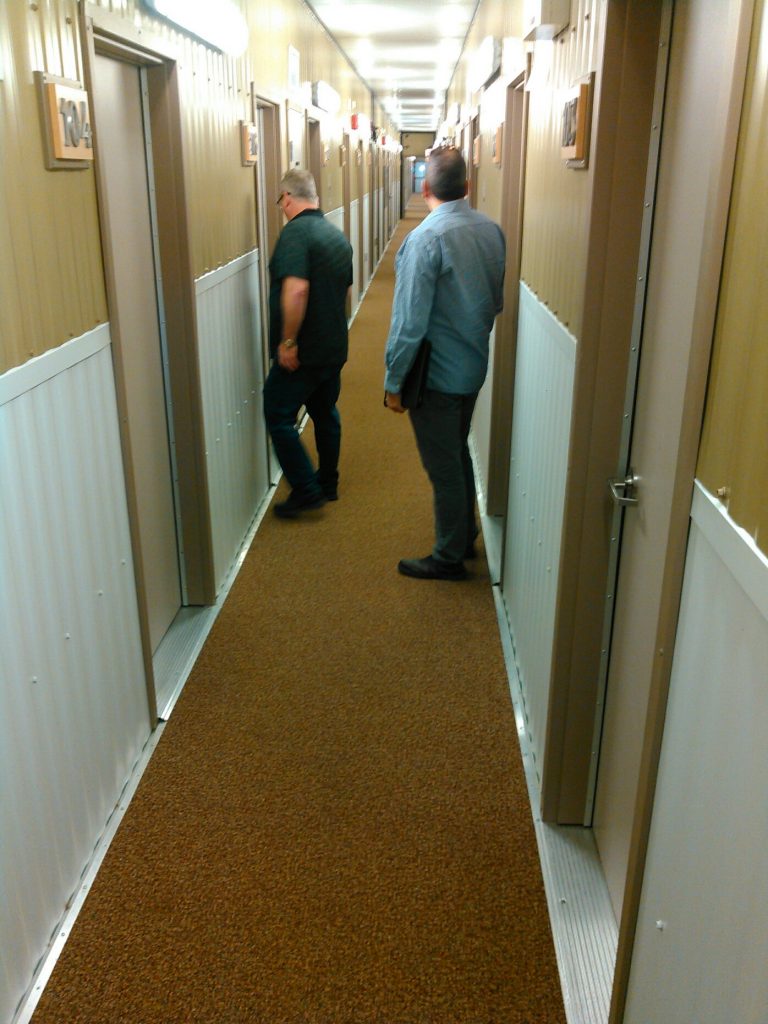
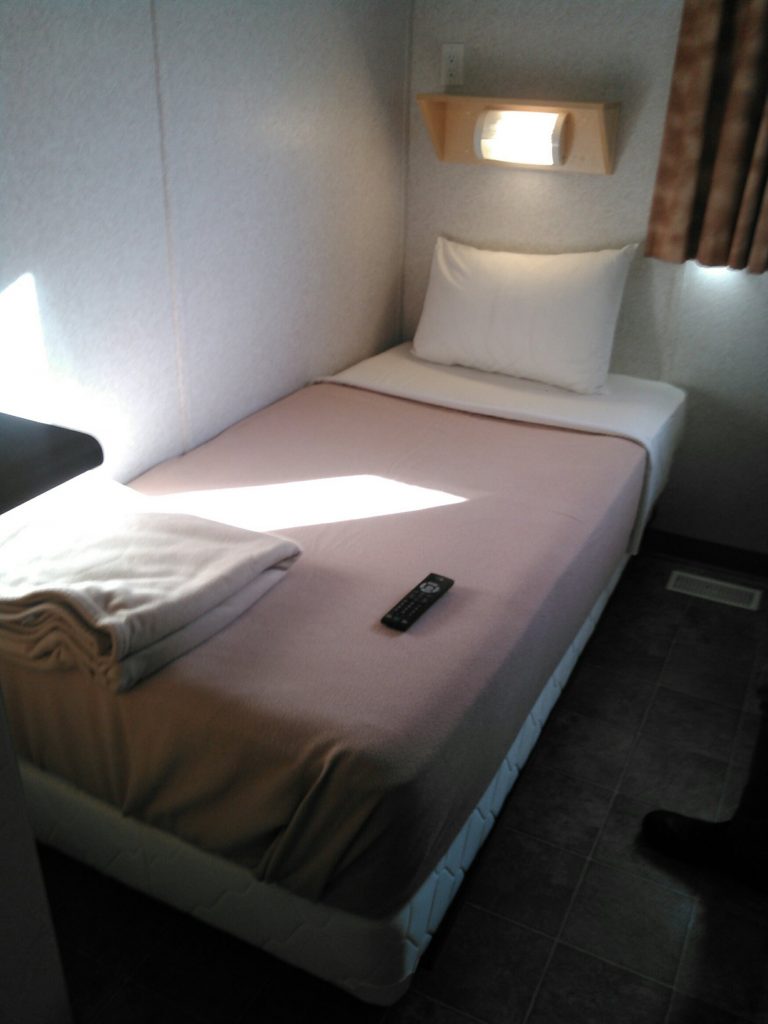



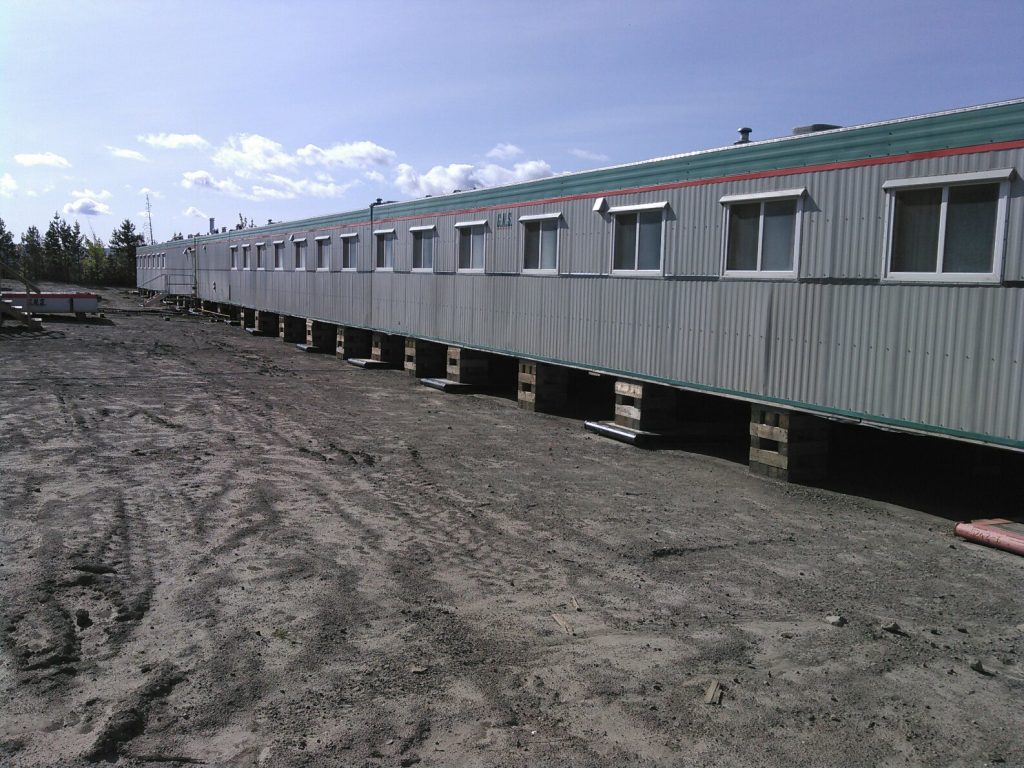
August 26, 2019
I have inspected the camp. The camp is clean, the food services good and the bunkhouses are clean with Wi-Fi and satellite tv. The four dorm style bunkhouses have 47 /48 rooms each. Each bunkhouse has 6 semi private bathrooms. That means 6 lockable rooms each having a toilet, shower, sink, in each bunkhouse. There is a movie theatre, two gyms, an enclosed smoking area. The food services will take your lunch order the night before and put it out with your name on it. Full service is 0530 to 0730 and 1730 to 1930. The mess hall has round tables and booth style seating. It is brand new.
The camp operator Flite and CNRL have to provide us the risk/hazard assessment and evacuation plan yet, and the fire alarm system has not been tested yet. Those two items are a must or the camp won’t be approved. They have all other health department permits and inspections. Our most critical item is the evac plan. The camp is situated uphill and about a half km from the plant.
I understand that the company will provide a van or bus to take members to town on the day off or as needed. I have been told this is a dry camp. I have yet to confirm this. I will post photos of the camp facilities later. The company is insisting this is a camp job and as long as the risk assessment and evac plan is made available and is acceptable the camp will meet camp standards. I can say they may have trouble getting the workforce if they don’t flex on the dry camp designation. I will advise on the evac plan fire alarm inspection etc asap. Geoff Higginson
August 21, 2019
The camp will be inspected next Monday and a report and recommendation to members will be made late in the day.
This camp is not inspected or approved to date under the terms of our collective agreement. Please see the excerpts from email exchange with the CLRA and Clayburn below.
From: “Geoff Higginson”
Date: Fri, Aug 16, 2019 at 9:54 PM -0700
Subject: Re: Pine River CNRL Camp at Gas Plant
To: “Chris Mydske” “Jason Bodnarek”
Cc: “Paul Strangway” “Derrill Thompson”
We have no intention of ceasing to advise our members it is not an authorized camp and they are entitled to LOA, unless and until it becomes an authorized camp. Go ahead and file a grievance or a complaint at the Board, and we will be there to defend ourselves.
As for your adamant disagreement with our statement that “you going to our members directly and asking them to stay in a camp that hasn’t been inspected is bargaining directly with them and is a violation of the agreement.” We stand ready to file a grievance if you continue to do so.
Geoff Higginson, President
IUBAC Local 2 BC
From: Chris Mydske
Sent: Thursday, August 15, 15:08
Subject: Pine River CNRL Camp at Gas Plant
To: Geoff Higginson IUBAC Local 2 BC President
Cc: Paul Strangway, Jason Bodnarek
Hi Geoff, please be advised that Clayburn has asked CLR to deal with this matter on their behalf. I wanted to first say that we are actively looking to gather as much information as possible about the camp. We will be happy to work with you in that regard and share any information with you when we obtain it. Although we hope to get this information soon and clear up any issues, I did feel it was appropriate to respond to a number of your comments.
We adamantly disagree with your statement that us going to your members directly and asking them to stay in a camp that hasn’t been inspected is bargaining directly with them and is a violation of the agreement. Article 12.202 (a) reads as follows,
“Camp accommodations, when supplied, shall meet the standards and requirements of the applicable Construction Camp Rules and Regulations Agreement by and between BCBT and CLR. An Employee may refuse to live in accommodations which do not meet such standards.”
The second sentence says that an employee may refuse to live in accommodations which do not meet such standards (we don’t know if this camp meets the standards or not). If the may refuse, then they may also not refuse. The choice is theirs. If a member decides to stay in this camp without it being inspected, it is not a breach of the collective agreement. Also, this in no way means CLR or Clayburn is bargaining directly with your members. The collective agreement clearly contemplates this and gives the employees the right to make their own decision. Mr mydske’s statement is false. This part of the collective agreement does not kick in until the camp is approved.
We take strong exception to you having “instructed our members to not accept work on this job unless they are offered the usual choices of Loa or room and meal allowance and unless otherwise notified by the union”. Article 12.202(a) clearly gives them an option and “instructing” them not to exercise an option provided to them by the Collective Agreement is not appropriate. If you continue to take this position we will have no choice but to look at filing a grievance and/or complaint at the Labour Relations Board. Mr Mydske is dead wrong again. If the camp is not approved then it is not a camp job. If it is not a camp job then you have the choice of Loa or room and meal allowance and the union will instruct you not to go to the camp. Mydske threatens but has no teeth. As you noticed we are not at the labour board and CLRA is planning on a proper examination of the camp.
We have already discussed on a number of occasions situations where members have had to sit out for a day or two on an out of town job. Although our contractors do their best to work with clients to ensure this does not happen, there are times when the circumstances of the project makes this unavoidable. Although this is an inconvenience, it is not a violation of Collective Agreement. Nor is there any requirement to lay off and pay return travel under these circumstances.
Thanks.
Chris Mydske | Director, Labour Relations
Construction Labour Relations Association of BC
From: Geoff Higginson < ghigginson@bac2bc.org>
Date: Aug 14, 2019 10:07 PM
Subject: Pine River CNRL Camp at Gas Plant
To: Jason Bodnarek < jason.bodnarek@clayburnservices.com>
Cc: Geoff Higginson < ghigginson@bac2bc.org>,BAC #2 BC < info@bac2bc.org>, pstrangway@clra-bc.com
Jason
I understand that Clayburn has been trying to secure workforce for a job at the Pine River gas plant for a September 15 start. Scott Darroche has informed me that the client is demanding that our members park their vehicles in Chetwynd in a secured parking lot and then ride a bus to a camp of some kind which has been built by CNRL near the gas plant and be required to stay in the camp for the balance of the shut down.
Under our collective agreement all camps must meet camp standards established by an agreement between the BC Building Trades and the CLRA and be inspected and approved prior to occupancy. We have no idea of the standards of this camp and it has not been Inspected by representatives of the unions And the CLRA. The camp in question does not appear to even be licensed or listed under the northern health listing of construction camps. We have no idea if it has been permitted by the health department or what kind of food services are present. The union is also aware that the gas plant in question has the highest SO2 emissions in the province so we are concerned about our members being asked to stay in a camp of unknown nature so near the plant. This is not to say the camp and commissary are unacceptable. It is just that we have absolutely no information.
I have instructed our members to not accept work on this job unless they are offered the usual choices of Loa or room and meal allowance and unless otherwise notified by the union.
Be advised that any attempt by the CLRA or Clayburn to negotiate directly with our members as to whether or not they “choose” to stay in his unknown camp will be responded to in no uncertain terms as a grievance, as any changes to the collective agreement must be enabled in writing and mutually agreed to, not to mention we are the employees exclusive bargaining agent.
There have been other issues with this client in the past for our members. Specifically, arriving for a short term shutdown only to find that the client has advised our contractors that they did not need our members on a particular day or days and have demanded that they stay in the hotel and not be paid for the day. If our members are going to leave their families for a short term shutdown we expect the client and the contractor to inform the member of whether or not there will be random days off so they can make an informed decision as to whether or not to accept the work hire. Especially on shut downs less than a week or two. Certainly if work is not available our members should receive a layoff and their return travel.
The contact at the plant whom Scott Darroche referred me to in relation to the camp is Chris Engel, 780 292 2730 Chris.engel@cnrl.com
Please send us details of this “camp” as soon as possible so we can sort out how to get this work completed.
The camp regulations are not much different from Alberta’s. As this is a new camp, we expect it to be up to snuff and in particular to be approved and properly licensed.
Geoff
President, IUBAC Local #2 BC
Today is double time. If you were hired for five tens and showed up for work today, call the union hall or president if you are asked to take a shortened day.